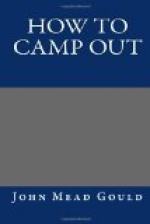FOOTNOTES:
[23] A flannel dress, the skirt coming to the top of the boots, and having a blouse waist, will be found most comfortable.
[24] It is no novelty for women and children to camp out: we see them every summer at the seaside and on the blueberry-plains. A great many families besides live in rude cabins, which are preferable on many accounts, but are expensive. Sickness sometimes results, but usually all are much benefited. I know a family that numbered with its guests nine ladies, five children ("one at the breast"), and the paterfamilias, which camped several weeks through some of the best and some of the worst of weather. The whooping-cough broke out the second or third day; shortly after, the tent of the mother and children blew down in the night, and turned them all out into the pelting rain in their night-clothes. Excepting the misery of that night and day, nothing serious came of it; and in the fall all returned home better every way for having spent their summer in camp.
[25] The mesh of a net is measured by pulling it diagonally as far as possible, and finding the distance from knot to knot; consequently a three-inch mesh will open so as to make a square of about an inch and a half.
[26] The field allowance in the United States army is nearly 1-1/8 pounds of coffee and 2-1/8 pounds of sugar (damp brown) for two men seven days; the bread and pork ration is also larger than that above given; but the allowance of potatoes is almost nothing.
CHAPTER XI.
DIARY.
By all means keep a diary: the act of writing will help you to remember these good times, and the diary will prove the pleasantest of reading in after-years. It is not an easy thing to write in camp or on the march, but if it costs you an effort you will prize it all the more. I beg you to persevere, and, if you fail, to “try, try again.” I cannot overcome the desire to tell you the results of my experience in diary-writing; for I have tried it long, and under many different circumstances. They are as follows:—
First, Any thing written at the time is far better than no record at all; so, if you can only write a pocket diary with lead pencil, do that.
Second, All such small diaries, scraps, letters, and every thing written illegibly or with lead pencil, are difficult to preserve or to read, and are very unhandy for reference.
Third, It is great folly to persuade yourself that after taking notes for a week or two, or writing a hurried sketch, you can extend or copy and illuminate at your leisure.
Consequently, write what you can, and let it stand with all its blots, errors, and nonsense. And be careful, when you are five years older, not to go through the diary with eraser and scissors; for, if you live still another five years, nothing will interest you more than this diary with all its defects.




